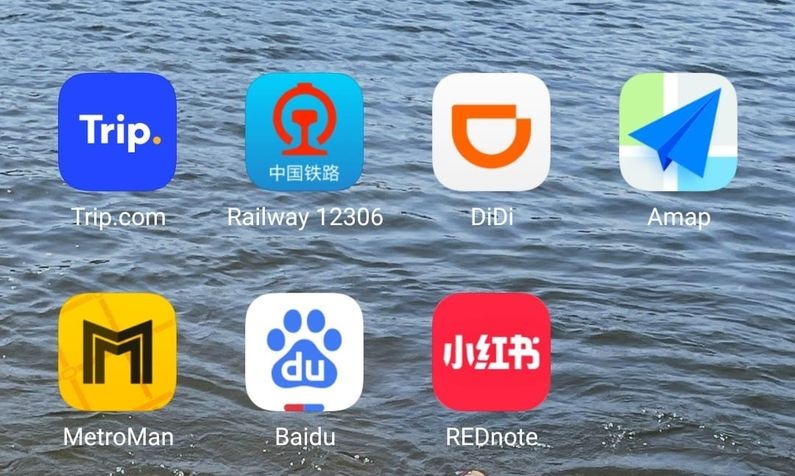Traveling in China for a brief period, like 15 days, can be immensely rewarding, but it also comes with a unique set of challenges—especially when it comes to navigating daily essentials such as transportation, payments, and internet access. To make the most out of this journey, foreign travelers should consider downloading a few essential apps that cover everything from accommodation and transport to mapping and payment systems. Here’s an overview of the must-have apps that can turn a potentially complex trip into a seamless adventure.
1. Booking Flights and Accommodation with Trip.com
Trip.com is an internationally friendly app that provides all-inclusive booking options for flights and accommodation across China. The app simplifies travel planning by offering options for booking all parts of a journey from a single platform, complete with English support and a user-friendly interface that streamlines the reservation process. For foreign travelers, booking flights and hotel accommodations on Trip.com is advantageous because it eliminates the need to navigate language barriers on Chinese-only booking platforms. Plus, Trip.com often has deals for various destinations, which can help travelers stay within budget without compromising on convenience or comfort.
2. Buying Train Tickets on 12306: Essential for Efficient Travel
China’s high-speed rail network is extensive, covering cities large and small. The 12306 app, also known as the official Chinese Railways app, is a reliable tool for booking train tickets. Tickets can be reserved up to 15 days in advance at 10 a.m. China time, and the app also allows for last-minute bookings, sometimes as close as 25 minutes before departure. This flexibility is helpful, but it’s essential to remember that security and ID checks are mandatory, so travelers should factor in additional time for these processes. The 12306 app, which securely stores all passport details, is highly convenient and considered one of the best apps for foreigners traveling around China. However, the app’s interface is primarily in Chinese, so using it with translation tools or with help from locals can make the experience more manageable.
3. Didi: Reliable and Affordable Ride-Sharing
Didi is China’s answer to Uber, and for travelers, it provides a comfortable and convenient way to get around. The app operates similarly to Uber, allowing users to know the fare before booking a ride. Often, it’s cheaper than taking taxis, especially when traveling in groups or with luggage. Didi is available in major cities and covers diverse ride types, from standard cars to premium options. While the app operates mostly in Chinese, recent updates include partial English support, making it easier for international travelers to use. Foreigners should keep in mind that payment is processed through platforms like WeChat Pay or Alipay, so setting up these accounts in advance can be useful.
4. Navigating with Amap (高德地图)
Amap, known as Gaode Ditu in Mandarin, is a highly accurate and widely used navigation app that foreign travelers can use in China. It provides real-time directions, traffic updates, and even detailed walking and biking routes, making it incredibly useful for tourists who want to explore on foot or by bike. Although Amap’s interface is mainly in Chinese, some basic features are available in English. This app becomes especially useful in areas where Google Maps may be less accurate or unavailable due to restrictions on Western applications.
5. MetroMan for Subway Navigation
The MetroMan app is an invaluable tool for travelers navigating China’s vast subway networks. Available in English, the app helps users find routes, determine pricing, and get real-time updates on subway schedules. MetroMan also allows travelers to download maps in advance, which can be especially useful for conserving data and staying on track without an internet connection. For travelers staying in large cities like Beijing, Shanghai, or Guangzhou, MetroMan simplifies public transportation by showing them the quickest routes with up-to-date fare information.
6. Baidu as a Google Alternative
In China, Google services are generally restricted. To compensate, Baidu serves as a reliable search engine alternative that provides similar functionality. Although the search results are primarily in Chinese, Baidu’s image and video search options are universally understood, making it a helpful tool for finding landmarks, translating signs, or learning more about popular destinations. For those with a Chinese SIM or VPN, Baidu is an excellent go-to for quick online queries while exploring.
7. RedNote for Travel Inspiration
RedNote is a content-rich app that caters to travelers by providing blog posts, articles, and videos on various destinations, many of which are created by other travelers. While it offers valuable insights, such as recommendations for restaurants or hidden gems, it’s worth noting that videos on RedNote can be data-intensive. For those without unlimited data plans, a Wi-Fi connection is recommended when browsing the app for travel inspiration.
8. WeChat for Communication and Payments
WeChat is perhaps the most essential app for foreigners visiting China. It serves multiple purposes, from communicating with locals to making payments. For those who don’t have a Chinese SIM, WeChat allows communication via Wi-Fi, which is particularly useful for travelers who want to connect with guides, service providers, or even new friends met along the way.
In terms of payments, WeChat Pay has become a staple across China, covering everything from street vendors to high-end stores. However, foreigners should be aware of a 3% transaction fee for payments exceeding 200 RMB when linked to international cards. Additionally, some merchants may not accept foreign-linked WeChat accounts, so it’s advisable to have cash as a backup in these cases. Deposits, like those for audio guides or rentals, can also be processed through WeChat, with refund policies varying depending on the amount and merchant preferences. Travelers can easily manage balances by using funds for daily expenses or by withdrawing from specific ATMs that accept WeChat Pay.
Additional Tips for Foreign Travelers
Finally, one of the biggest challenges for foreigners in China is currency exchange and making payments. Recently, there has been news of the Industrial and Commercial Bank of China (ICBC) establishing branches in foreign countries. If ICBC opens a branch in your country, you may be able to pay Chinese vendors directly in RMB, potentially avoiding exchange rate losses.
Navigating China as a foreigner can be challenging, but with the right apps, travelers can enjoy seamless journeys, access local insights, and even shop or dine without language barriers. Downloading these essential apps will ensure that every aspect of your trip, from booking to payments, is manageable and enjoyable.




